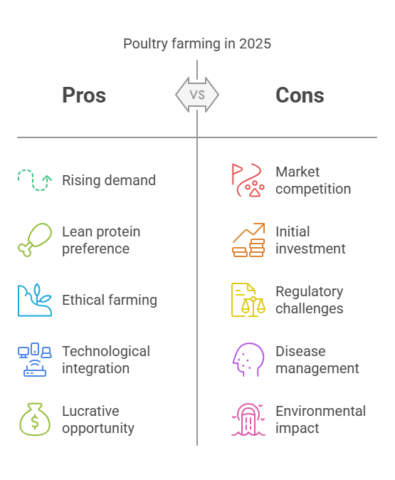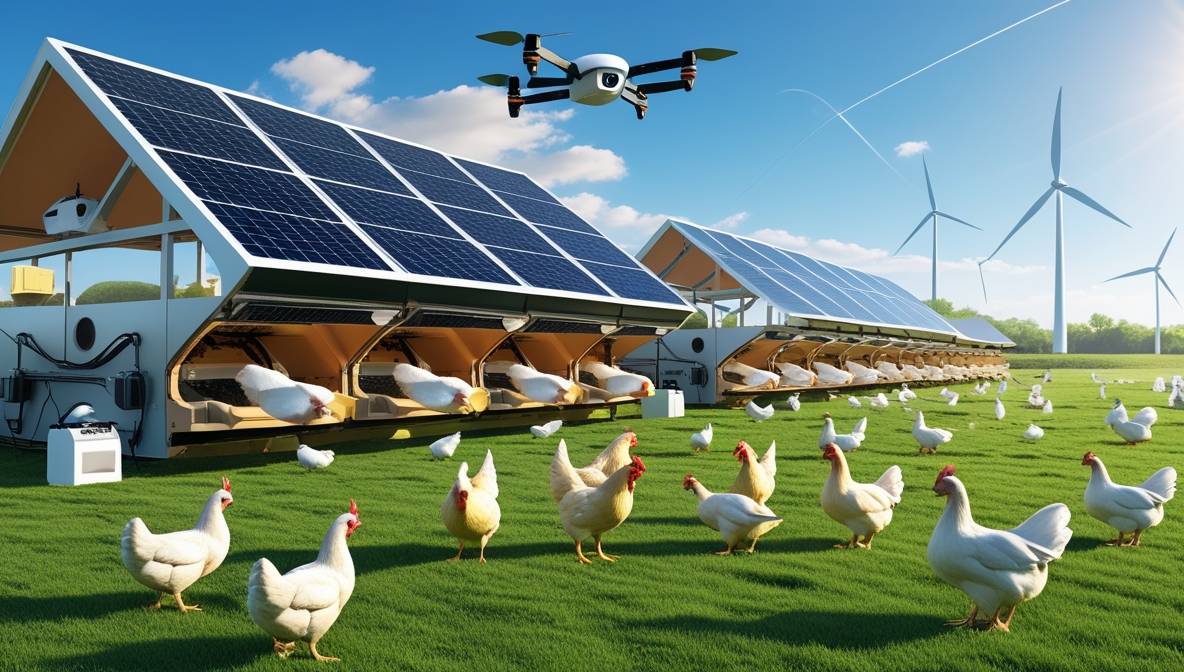Poultry farming continues to dominate the agricultural sector in 2025, combining traditional practices with cutting-edge technology. With global demand for poultry products projected to rise by 8% this year, driven by consumer preference for lean protein and ethical farming, this venture remains a lucrative opportunity. Whether you’re a novice or scaling an existing operation, here’s how to thrive in today’s evolving market.

Why Poultry Farming in 2025?
The appeal of poultry farming lies in its low startup costs, rapid ROI, and alignment with sustainability trends. Modern advancements like AI-driven health monitoring and vertical coop designs maximize efficiency.
Key Benefits:
- Cost-Effective Entry: Start with as few as 50 birds using modular coops (2,000–2,000–5,000 initial investment).
- High Demand: 72% of consumers prioritize pasture-raised poultry, per a 2024 USDA report.
- Community Impact: Direct sales via farm-to-table apps like LocalHarvest strengthen regional economies.
Who Should Start a Poultry Farm in 2025?
Poultry farming suits individuals passionate about sustainable agriculture and animal welfare. With automation reducing labor needs, even urban farmers can manage small-scale operations.
Prerequisites:
- Basic knowledge of animal husbandry.
- Access to 0.5–2 acres (depending on flock size).
- Compliance with updated 2025 USDA biosecurity protocols.
Choosing Your Poultry Type: 2025 Insights
Selecting the right bird hinges on market demand and operational capacity.
| Poultry Type | Avg. ROI (2025) | Space/Bird | Key Market |
|---|---|---|---|
| Broiler Chickens | 22% | 1.5 sq ft | Meat Production |
| Layer Hens | 18% | 2 sq ft | Egg Sales |
| Ducks | 15% | 3 sq ft | Specialty Meat/Eggs |
| Turkeys | 20% | 4 sq ft | Holiday Demand |
Source: 2025 Poultry Farmers of America Report
Trend Alert: Quail farming is rising in urban areas due to compact space needs and premium pricing ($8/dozen eggs).
Optimal Locations for Poultry Farms in 2025
Climate resilience is critical amid shifting weather patterns.
Top U.S. Regions:
- Midwest: Moderate climate and affordable land.
- Pacific Northwest: High demand for organic poultry.
- Southeast: Year-round grazing, but monitor hurricane risks.
Pro Tip: Use Climate.gov tools to assess local disease risks like avian flu hotspots.
Modern Challenges in Poultry Farming
Stay ahead of these 2025 hurdles:
- Disease Outbreaks: H5N1 variants caused 12% flock losses in 2024.
Solution: Adopt RFID tagging for real-time health tracking. - Regulatory Shifts: New EPA waste management rules effective July 2025.
- Predator Deterrence: Drones with thermal cameras reduce fox/raccoon attacks by 40%.
Step-by-Step Farm Setup for 2025
1. Housing & Infrastructure
- Modular Coops: Use solar-powered, ventilated designs ($120/bird).
- Free-Range Tech: GPS trackers monitor grazing patterns.
2. Licensing
- Secure a FDA Facility ID and state-specific permits (avg. 6-week processing).
3. Feed & Nutrition
- 2025 Trend: Insect-based feeds reduce costs by 15% and lower carbon footprints.
4. Biosecurity
- Install footbaths with antiviral agents.
- Quarantine new birds for 14 days.
Raising Chickens and Ducks: Best Practices
Space Requirements
| Bird Type | Indoor Space | Outdoor Space |
|---|---|---|
| Chicken | 2 sq ft | 8 sq ft |
| Duck | 3 sq ft | 10 sq ft |
Diet Guidelines
- Chickens: 17% protein feed + probiotics.
- Ducks: Niacin-rich feed + aquatic plants.
FAQs for 2025 Poultry Farmers
Q: What’s the best AI tool for flock management?
A: FarmWise AI offers disease prediction analytics (from $99/month).
Q: How do 2025 carbon credits impact poultry?
A: Farms using renewable energy qualify for tax offsets (up to $1,200/year).
Q: Are hemp-based feeds viable?
A: Yes—approved by FDA in 2024 for omega-3 enrichment.
See also, Pig Farming, Basic Steps, and Information.







